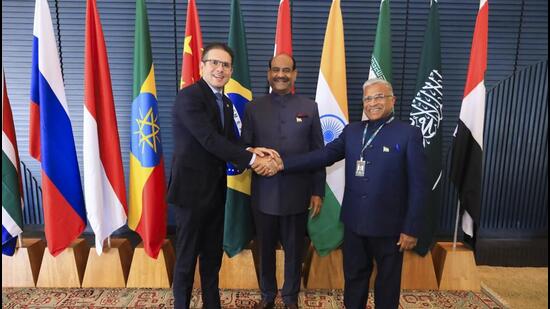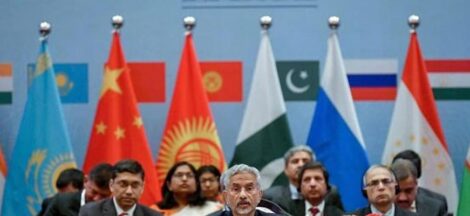The 11th Brics Parliamentary Forum issued a firm condemnation of the terror attack that took place on April 22 in Pahalgam, calling for enhanced and coordinated measures to combat terrorism. The statement, released by the Lok Sabha Secretariat, reflected the collective stance of the ten member countries attending the forum in Brasilia, Brazil.
Delegates from India, Brazil, Russia, China, South Africa, Iran, the United Arab Emirates, Egypt, Ethiopia, and Indonesia convened to discuss multiple global challenges, with the Pahalgam incident emerging as a critical issue requiring unified parliamentary action. The Indian delegation was led by Lok Sabha Speaker Om Birla, who emphasised the need for stronger legislative cooperation to address the evolving threats posed by terrorism across the member nations.
The communique underscored the importance of sharing intelligence and best practices among the Brics and partner countries to disrupt terror networks and prevent future attacks. It recognised that terrorism remains a persistent threat undermining international peace, security, and development, with particular reference to violent incidents such as the one in Pahalgam, which targeted civilians and heightened tensions in a sensitive region.
The Pahalgam attack resulted in casualties and drew widespread condemnation within India and abroad. The parliamentary leaders reaffirmed their resolve to enhance dialogue and legislative oversight, aiming to strengthen anti-terrorism frameworks domestically and through multilateral platforms. This marks a clear signal from the forum’s member states to adopt a united front against terrorism.
The presence of countries beyond the traditional Brics membership, including Iran, the UAE, Egypt, Ethiopia, and Indonesia, added a broader geopolitical dimension to the discussions. These nations share concerns about rising extremism and its regional spillovers, highlighting the forum’s evolving role as a platform for wider cooperation among emerging and developing economies.
Discussions extended beyond terrorism to encompass economic cooperation, sustainable development, and global governance reforms, but the Pahalgam attack became a focal point given its implications for regional stability. Delegates stressed the necessity of legislative measures that not only target terrorist groups but also address root causes such as socio-economic disparities, ideological radicalisation, and cross-border support mechanisms.
The adoption of the joint declaration reflected a consensus on coordinated parliamentary efforts, calling for more robust legal frameworks, capacity building, and improved coordination with international agencies tasked with counterterrorism. This cooperation aims to enhance the resilience of member states against asymmetric threats and disrupt the financing and logistics that enable terrorist operations.
Om Birla, addressing the forum, highlighted the impact of terrorism on democratic institutions and the rule of law. He stressed that parliaments have a unique responsibility to ensure that governments enact effective laws balancing security needs with human rights protections. His remarks called for sustained dialogue to foster mutual trust and cooperation across the diverse member nations.
The forum’s communiqué also reiterated the commitment of the Brics and partner countries to uphold the principles of sovereignty and territorial integrity, condemning any attempts to use terrorism as a means to destabilise governments or infringe on national borders. This stance aligns with India’s position on cross-border terrorism and reinforces the global call for dismantling terror infrastructure irrespective of its origin.
Efforts to tackle terrorism were linked to broader security challenges, including cyber threats, organised crime, and radicalisation via social media platforms. Delegates acknowledged that the dynamic nature of terrorism requires continuous adaptation of laws and policies. There was agreement on the need for parliamentary forums to remain engaged and responsive to emerging threats to safeguard citizens.
The inclusion of non-Brics nations at this forum signals a growing recognition of the interconnectedness of security challenges and the value of multilateral parliamentary diplomacy. The outcomes of this meeting could shape legislative cooperation and policy coordination in areas beyond traditional economic collaboration, notably in counterterrorism and peace-building efforts.
India’s leadership at the forum through Om Birla was seen as a diplomatic success, showcasing its proactive role in pushing for collective security mechanisms. The parliamentary forum, initially focused on enhancing economic ties among Brics nations, is evolving into a platform for addressing complex geopolitical and security issues affecting member states and their extended partnerships.
The communique’s emphasis on a unified approach to terrorism sends a clear message of solidarity with victims of attacks such as that in Pahalgam. It also reflects a strategic alignment among these countries to strengthen global governance on security matters while respecting national legal processes and sovereignty.
As terrorism continues to challenge peace and development worldwide, the forum’s resolution offers a framework for legislative bodies to work more closely, promoting resilience through laws that enable efficient prevention, investigation, and prosecution of terror-related crimes. This collective parliamentary commitment could set the stage for further collaborative action in other international forums.
The ongoing dialogue between Brics and its extended partners also includes exploring technological cooperation, intelligence sharing, and capacity building in law enforcement agencies. These practical steps, outlined during the forum, aim to enhance the collective ability of member states to respond to terrorist threats swiftly and effectively.
The parliamentary forum has gained increasing significance as it facilitates inter-parliamentary dialogue beyond executive diplomacy. This platform provides lawmakers with the opportunity to influence policy formulation and promote transparency and accountability in security governance across member countries.




 Canada Defends India’s G7 Summit Invitation
Canada Defends India’s G7 Summit Invitation 